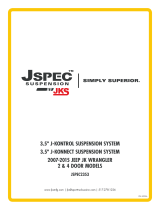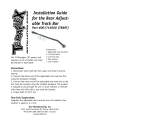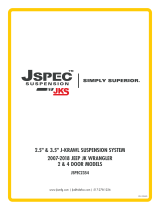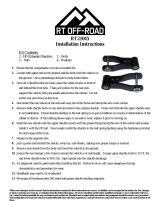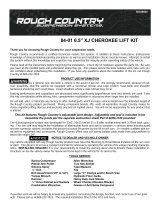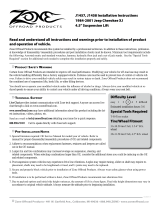Page is loading ...

RUBICON EXPRESS. 3290 MONIER CIR. RANCHO CORDOVA, CA. 95742 916-473-4600
INSTALLATION INSTRUCTIONS FOR:
RE6200 XJ 5.5” EXTREME-DUTY SUSPENSION SYSTEM
Safety Warning:
Suspension systems or components that enhance the off-road performance of your
vehicle may cause it to handle differently, on and off-road, than it did from the
factory. Care must be taken to prevent loss of control or vehicle rollover during
sudden maneuvers. Failure to drive the vehicle safely may result in serious injury
or death to driver and passengers. We recommend you always wear your seatbelt,
drive safely and avoid quick turns and other sudden maneuvers. Constant
maintenance is required to keep your vehicle safe. Thoroughly inspect your vehicle
before and after every off-road use.
Installation Warning:
We recommend that certified technicians perform the installations of our products.
Attempts to install these products without knowledge or experience may jeopardize
the safety of the vehicle. These instructions only cover the installation of our
products and may not include factory procedures for disassembly and reassembly
of factory components. Read instructions from start to finish and be sure all parts
are present before disassembling the vehicle. Included instructions are guidelines
only for recommended procedures and in no way are meant to be definitive.
Installer is responsible to insure a safe and controllable vehicle after performing
modifications. Do not perform test drives on public roads with partially completed
installations. Always double and triple check your work before use.
KIT CONTENTS:
RE1141 Gen2 sway bar disconnects
RE1345 Front coil springs
RE1383 Front bump stop extensions
RE1462 Leaf pack w/bushings
RE1515 Rear brake hose
RE1550 Front brake lines
RE1660 Adjustable track bar
RE1665 Track bar frame bracket
RE2120 Transfer case drop kit
RE2421 OR
RE1225 U-bolt kit (2421 = Dana 35/44, 1225 = 8.25)
RE2700 Extended shackle
RE3700 Pair of Lower fixed control arms
RE3780 Pair of Upper front Adjustable control arms
RE9900 Control arm drop kit
RE9905 Control arm brace kit
RE9921 Front sway bar relocation brackets
REQUIRED TOOLS:
Basic mechanics' hand tools
Jack stands and floor jack
Drill motor and drill bits, including 5/8”
Pickle fork for track bar removal
Spring compressors
Brake fluid
PRE INSTALLATION NOTE:
Control arm bushings are pre-lubed during initial assembly at Rubicon
Express. As general maintenance the control arm bushings should be
lubed with a silicone base grease as needed. Silicone base grease can
be purchased at your local auto parts store.
The Super-flex joints are also pre-lubed during initial assembly at
Rubicon Express. As general maintenance the super-flex joints should be
greased as needed and the outer spanner nut tightened on the joint.
Any type of grease will work on the Super-flex joints. Spanner nut tools
are available through Rubicon Express (RE3771 & RE3772) if needed for
tightening of the joints.
INSTALLATION:
Note: Read all instructions before beginning installation. 1984-1986
vehicles may require modifications to the front driveshaft for proper
installation. These vehicles use a double offset joint, while later vehicles
use a double cardan (Spicer) style CV-joint. The Spicer CV-joint may be
retro-fitted to the earlier vehicles by changing the transfer case output
yoke for the later model. Lift heights taller than 4.5” will require
modifications to the rear driveshaft. A CV-type driveshaft, transfer case
slip yoke eliminator and axle shims are recommended. Installation time
should be approx. 8 hours.
1. Raise vehicle and support with stands.
2. Remove wheels.
3. Remove front shocks.
4. Remove front sway bar end links.
5. Disconnect front track bar; it may be helpful to disconnect steering
linkage at pitman arm.
6. Remove front spring retainer clamps at bottom spring cup.
7. Remove front springs. Spring compressors may be helpful.
8. Support the front axle with jack stands.
9. Remove factory brake lines and replace with supplied stainless steel
lines. Some require positioning the block and line vertically at the
caliper. Watch line routing, use angle brackets and e-clips.
10. Remove the factory control arms that are to be replaced.
11. See instructions for installation of RE9900 control arm drop
brackets. Install now before proceeding.
12. Install the lower control arms with the rubber bushing at the drop
brackets. The super-flex assembly bolts to axle bracket with
supplied hardware. The offset tube is to be located as low as
possible (zerk on top – SEE PHOTO 1).
13. Install the new upper front adjustable control arms using supplied
hardware at axle end and factory bolt at frame end (don’t fully
tighten until vehicle is back on the ground). Set both control arms
to an initial length of 15 3/8” center to center. Further adjustment
may be needed at time of alignment for caster angle.
14. The 3” bump stop extension is to be located at the axle side spring
cup. Drill a 5/16 hole in center of cup and tap hole with supplied
self-threading bolt. This assembly will not be installed until after
springs are in place. Temporarily attach (use wire or tape) bump
stop inside coil while installing springs. Bolt in place when possible
(after coils are installed).
15. Install springs, use compressor or lever bar using caution, index
spring into lower spring cup. Caution! Coil springs have high
potential energy, which can cause injury.
16. In isolated cases the spring will rub the front of the bump stop
tower. If your spring rubs the bump stop tower you will need to
RI6200 Page 1 of 3

install a lower profile bump stop. You can also cut bend and re-weld
the tower for extra clearance.
17. Install the spring retainer removed in step 6. Use caution, this bolt
strips easily.
18. Install longer front shocks. Some require bar pins to be installed
through the bottom shock eyes (use light grease).
19. Install adjustable front track bar and bracket per instructions
supplied. Do not attach adjustable side until weight is on vehicle
and axle is centered.
20. Install sway bar quick disconnects per instructions supplied with
disconnects (SEE PHOTO 2).
21. Install new front brake lines using supplied anchor brackets.
22. Torque all bolts to factory specs and double check your work.
-REAR AXLE-
23. Remove the rear shocks.
24. Remove the rear sway bar. This will not be reused.
25. Support the rear axle.
26. Remove rear brake line and install supplied extended rear brake
line. Use line wrenches to avoid rounding off fittings. Tighten brake
line fittings before bleeding brakes.
27. Remove the u-bolts.
28. Remove factory spring packs.
29. Install new extended rear shackles (SEE PHOTO 3)
30. Install new springs in same manner as factory leaves (SEE PHOTO
4). (Don’t fully tighten spring eyebolts until vehicle is back on the
ground). The 3/8” center pins are stronger than stock and will
require enlarging the spring pad hole. The pins come with spacers
installed for use w/ floating type degree shims. Be sure spacers
don’t bottom out on axle tube – remove spacers as required. If
using steel Rubicon shims, remove the spacers and replace with the
shims (SEE PHOTO 5). These steel shims will require reaming to
3/8” for 3/8” pins.
31. Install new u-bolts.
32. Install longer rear shocks. Some require bar pins to be installed
through the top shock eyes (use light grease).
33. Install tires.
34. Lower vehicle to ground and adjust front track bar to center front
axle per instructions supplied with track bar.
35. Thoroughly bleed brake lines and check for leaks.
36. If installing RE2120 transfer case drop kit (see troubleshooting)
install it now. Support cross member with floor jack. The cross
member is factory mounted with two studs and two bolts. The studs
will have to be removed with a stud remover or by double nutting
them and backing them out. Lower the cross member just enough
to insert the spacers at each bolt hole and install bolts and washers.
37. Double-check all nuts and bolts.
38. Test drive and note location of steering wheel.
39. Adjust drag link to center steering wheel.
40. When possible, align vehicle to minimum factory caster and
maximum factory toe-in specifications.
41. Reminder: Do not reinstall the rear sway bar; it will not be reused.
< FRAME END (RUBBER) - PHOTO 1 - AXLE END (ZERK ON TOP) >
PHOTO 2
< TOWARD FRONT – PHOTO 3 – TOWARD REAR >
< FRAME END (LARGE BUSHING) – PHOTO 4 – SHACKLE END >
PHOTO 5
RI6200 Page 2 of 3

RI6200 Page 3 of 3
TROUBLESHOOTING
DRIVELINE VIBRATION:
In most all cases the factory rear driveshaft cannot be used with this lift. Rear shaft must be converted to CV-style. Install a slip yoke eliminator (SYE) kit
and CV driveshaft. Adjust pinion so it is 2 degrees below parallel with CV driveshaft (see acceleration and deceleration vibration troubleshooting below).
A transfer case drop kit can usually be omitted with a CV driveshaft.
Note, for a temporary solution it may be possible to install the RE2120 transfer case drop kit and buy the RE1822 extended slip yoke (84-95 only, 96
and newer have them) and shim rear pinion up until there is basically no angle at rear driveshaft.
Acceleration vibration: Caused by the pinion being too high in relation to the transfer case output shaft. On leaf sprung vehicles, install axle shims to
lower pinion accordingly.
Deceleration vibration: Caused by the pinion being too low in relation to the transfer case output shaft. On leaf sprung vehicles, install axle shims to
raise pinion accordingly.
HIGH SPEED WOBBLE:
A condition where front tires will shimmy after hitting a bump. Avoid bias ply tires and wheels with excessive offset. Check for worn or loose parts. In
most cases a reduction of positive castor will eliminate this condition. A good rule of thumb is minimum factory caster and maximum factory toe-in.
Always use front sway bar on road.
BUMP STEER:
Caused by improper relationship of drag link and track bar. To correct, center axle again following the instructions supplied with the track bar. Next
determine the neutral position of the steering wheel. Adjust the drag link to center the steering wheel.
/

